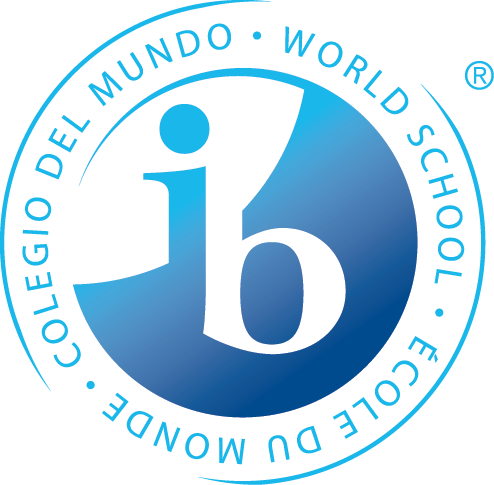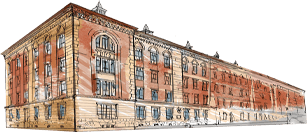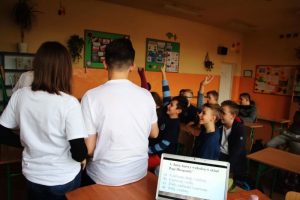2019/2020 school year
Please visit the photo gallery
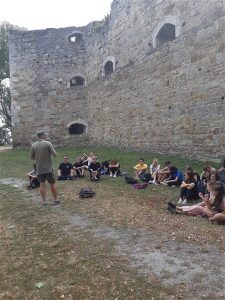 |
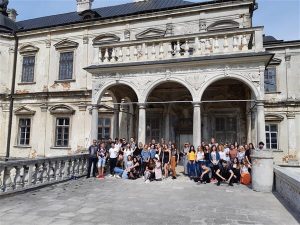 |
A trip to Ukraine as part of the Eastern Borderlands project – 05/09 – 09/09/2019.
A group of young people from High School no.
We visited Żółkiew, Lwów, Olesko, Podhorce, Poczajów, Krzemieniec, Zbaraż, Trembowla, Chocim, and Okopy św. Trinity, Kamieniec Podolski, Złoczów.
2018/2019 school year
Ola about the award in the ZNAK W SCHKOLE project – a summer internship in the editorial office of Znak monthly
In the recent period of time, I had the incredible pleasure to fill my holiday frolics with a week’s experience in the editorial office of the monthly “Znak” (how did it happen? What did you eat with?). I will not divide it here, but which previously seemed to me very mysterious and ambiguous. I encourage you to get to know it.
Suggestion: Headline: short but succinct. The smell of permanent work and office coffee, enriched with an extremely open and cordial team of the Miesięcznik, for which the editorial board is almost a lifestyle, long disputes on the border of philosophy, religion, art and natural sciences, awakened my faith in the bright future of individuals who are uncertain and undecided about their path career I belong to. The mere specter of fulfilling the function of a kind of Socrates, cooking delicious and sophisticated dishes for the thirsty for knowledge and answers to the people’s bothering questions, can make a humanist quite delighted, especially a frightened intern. By looking under the lining of creating the monthly, seeing its prime factors, knowing exactly the type, weight and color of the paper, you are able to see a huge and very satisfying picture of the work of many creative and world-curious people who want to expand new and new horizons both for themselves and their readers.
If among those interested there are those who really want to deepen (dismantle, crush, roll, mix …) the controversial content, or shape the controversy around these seemingly obvious, if one of you deigns to doubt in your life, or wants to enter the world of the current culture directly, drawing on knowledge about its foundations and whims from the best sources, I strongly encourage you to participate in the meetings of the “ZNAKU at school” and apply for those few hours of work that may result in stimulating passion and hope, or simply guarantee a ruler in the CV that requires improvement.
Aleksandra A. from the third grade
2017/2018 school year
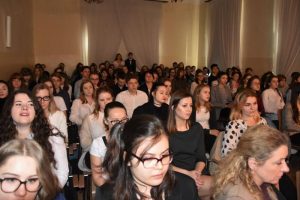 |
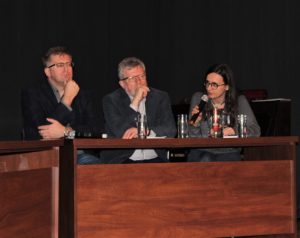 |
The memory of the people The memory of the place – KL Plaszów and the contemporary inhabitants of Krakow
Please visit the photo gallery
On April 17, a conference crowning the first stage of the project was held at our school
MEMORY OF PEOPLE. MEMORY OF PLACE.
PLASZOW CLASS AND CONTEMPORARY INHABITANTS OF KRAKOW.
The organizers of the conference were: VI High School, Center for Educational Research and Continuing Education at the Faculty of Polish Studies of the Jagiellonian University and the Polish Historical Society, branch in Krakow.
The honorary patronage over the ceremony and the entire project was assumed by the Voivode of Małopolska, Piotr Ćwik.
The event was graced by the presence of:
Piotr Ćwik – Voivode of Lesser Poland
dr Andrzej Kulig – Deputy Mayor of the City of Krakow for Culture and Social Affairs
Anna Korfel -Jasińska – Director of the Education Department of the Krakow City Hall
Ryszard Kotarba – author of a monograph on the KL Plaszow camp from the Institute of National Remembrance in Krakow
Monika Bednarek – Head of the Emilian Factory by Oskar Schindler
Marta Śmietana from Emilio Oskar Schindler’s Factory
Paweł Kubisztal – President of the Board of the Association PODGÓRZE.PL
prof. dr hab. Krzysztof Zamorski from the Institute of History of the Jagiellonian University
prof. dr hab. Mariusz Wołos from the Institute of the History of Archives of the Pedagogical University
dr hab. Roma Sendyka from the Department of Anthropology of Literature and Cultural Research of the Jagiellonian University
The project serves to publicize the topic, arouse social awareness and reflect on the place that serves Krakow’s residents for recreation and is, after all, the site of the former cemetery and concentration camp. We are talking about remembrance, forms of commemoration, about actions taken to increase respect for this place and the creation of a memorial site there.
The project aims to increase the historical and social awareness of students, among others on the importance of commemorating the past.
From the participants’ experience:
“For us, the students of High School No. 6, the project was something special, something that opened our eyes to many things. It showed how people can have different attitudes to history – for some it is something irreplaceable, others pass by indifferently without having a clue about it. The project was also something timeless for us. He took us to the times of World War II and its realities, so dear to us – after all, it all happened here, in this very place. However, moving back into the past, we stumbled upon the present, where we were shocked by the realities. A forgotten place, treated as something important only in terms of putting up a sign and making it a landscape place. We have learned for life that history will always leave its mark and we should want to notice them. So that the memory would not be lost. “
Media about yesterday’s event:
Magical Krakow
Portal dzieje.pl
http://dzieje.pl/edukacja/kl-plaszow-tematem-poszukiwan-krakowskich-licealistow
|
|
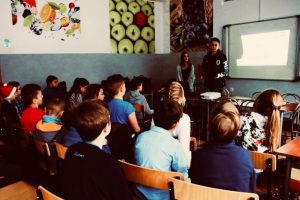 |
Social project Mr. Español as part of the Olympics Exempt from Theory.
In the 2017/18 school year, a group of students from the Spanish bilingual section of VILO undertook the implementation of a social project entitled “Mr. Español” as part of the Olympics Exempt from Theory. They conducted a series of workshops among children and young people, during which they introduced them to the advantages of learning this language and its beautiful sound, and introduced their younger colleagues to the secrets of the culture of Spanish-speaking countries.
Everyone knows that it is best to learn through play, so there was a lot of laughter during the classes, and at the end there was a quiz with prizes and sweets waiting for the kids. After an hour spent in the workshops, everyone was charmed by this beautiful language and interested in the diversity of the cultures of the countries presented. A large part of the participants even expressed their willingness to continue their adventure with Spanish, which pleased the organizers of the project, whose aim was to promote the Spanish language.
Have a look at the photos from the workshops!
2016/2017 school year
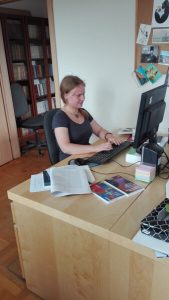 |
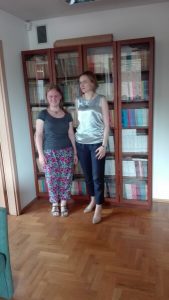 |
SCHOOL SIGN
Weronika Tupaj, the author of the best texts in the first edition of the Znak w Szkole project, received the first prize – a one-week summer internship in the editorial office of Znak monthly. Below is a short account of the winner. We would also like to congratulate and thank all participants of the project for their commitment and interesting work.
We invite you to participate in the second edition of the project. We accept applications via the Librus journal.
Project supervisors
Iwona Ryż and Jakub Pstrąg
On the map of Krakow, there is a place where the intellectual life of Poland is co-created, while eating delicious dinners and drinking fantastic coffee. You can discuss, review, read the submitted texts, correct mistakes and observe the flawless work of ingenious people.
This place also exists in reality, what’s more, I had the opportunity to become part of it for a while. Thanks to VILO’s participation in the program “ZNAK at school”, the editors of the “ZNAK” monthly hosted me for a week. During the internship, I had the opportunity to see how this extraordinary newspaper is created and how the unique atmosphere of the surrounding environment is created. I hope to join him permanently someday.
Weronika Tupaj
SCHOOL SIGN
The last meeting in the Znak w Szkoła Szkół series devoted to Islamophobia was held on April 11 at the VII Private Secondary School in Krakow. Konrad Pędziwiatr, the author of numerous scientific and popular science publications on ethnicity and Islam, as well as an assistant professor at the Department of European Studies at the University of Economics, acted as an expert. The discussion lasted a very long time due to the lively interest of students in the subject of migration in Europe. The group of students from the 6th High School was, as usual, very well prepared.
Coordinators: Iwona Ryż, Jakub Pstrąg
SIGN AT SCHOOL: INTERNSHIP FOR WERONIKA TUPAJ AND AWARD FOR MAŁGORZATA CIERLIK!
Congratulations to Weronika Tupaj and Małgorzata Cierlik for the distinctions in the Znak w Szkole project. Weronika, mainly thanks to her excellent, mature articles, accurate observations and involvement in discussions, received the main prize, i.e. one-week internship at the Editorial Office of the Znak monthly. We are waiting for her report. Małgorzata received a book award for active participation in meetings, columns, reliability and work put into the project. We would like to thank and congratulate all participants of the first edition, especially Weronika and Małgorzata.
At the same time, we invite everyone interested in journalism and social problems to participate in the next edition of the Znak w Szkole project from September!
Coordinators: Iwona Ryż, Jakub Pstrąg
SCHOOL SIGN
We would like to inform students who would like to join the interschool discussion club under the patronage of the Znak monthly that two places have become available in our high school group. We would like to remind you that the reward for active participation and work in the project, in addition to the opportunity to meet interesting people from the world of science and culture and expand your knowledge, is the publication of your own texts on the website of Znak monthly, as well as a week-long internship in the editorial office.
Please contact us!
Guardians
p. Iwona Ryż, p. Jakub Pstrąg
SCHOOL SIGN
On January 20, 2017 in the VII Private High School for them. Mikołaja Rej in Kraków, another in a series of meetings of the discussion club under the patronage of the Znak monthly. This time, a lecture by Dr. Paweł Boguszewski, an employee of the Institute of Experimental Biology M. Nencki of the National Academy of Sciences, and a discussion with young people from four high schools in Krakow will be devoted to the topic of moral progress.
We would like to remind you that the school group of Znak w Szkole club members currently consists of 8 people, while membership and active team work will be rewarded with the publication of texts on the Znak monthly website and a week’s summer internship in the editorial office. We cordially invite interested parties to join us (we have 2 vacancies).
Project supervisors
Iwona Ryż
Jakub Pstrąg
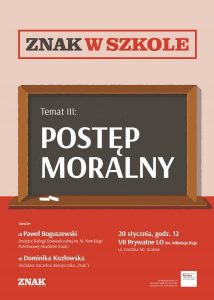
The second meeting of the Znak interdisciplinary discussion club will be held at 10:00 am, on October 17 at the VII Private High School in Krakow. The meeting will be conducted by the students of our school, and the guest and expert will be the philosopher, psychologist and lecturer Mir Marcinow. This time we will discuss the fate and status of animals in today’s world. We will base our considerations on three texts published in the Znak monthly..
Animals
1. You are the one, Justyna Siemienowicz talks to Zbigniew Mikołejka, No. 720
2. Krzysztof Kornas, More and more humanoid monkeys, No. 720
3. Mira Marcinów, Schizofretki i kotpulsywni psychopacie, No. 720
Project supervisor: Iwona Ryż, Jakub Pstrąg
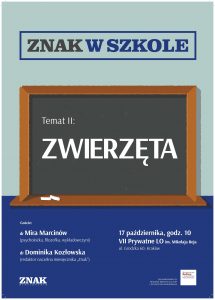
2015/2016 school year
SCHOOL SIGN
The first meeting in the “SIGN IN SCHOOL” series will be held on May 25 at 12:00 at the VII Private High School. Mikołaja Rej in Krakow and will be on the topic: the body.
The main guest and expert of the meeting will be a lecturer at the Jagiellonian University, dr hab. Bartłomiej Dobroczyński.
We will base our discussion on two texts of the Znak monthly:
- Lęki współczesności: ciało – bóg i wróg, Z Bartłomiejem Dobroczyńskim rozmawia Olga Drenda, nr 694
- Katarzyna Pilorz, Ciało, duch, ruch, nr 674
Coordinators: Iwona Ryż, MA, Jakub Pstrąg, Ph.D.
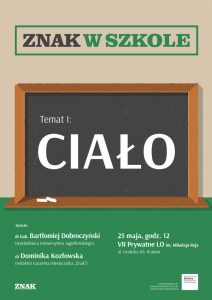
School sign
INVITATION TO PARTICIPATE IN THE CYCLE OF MEETINGS UNDER THE PATRONAGE OF THE MONTHLY SIGN
Dear students,
Educational Foundation J. S. Bandtki and the editorial staff of the Znak monthly invite you to participate in the series of meetings “Znak at school”. We are looking for 10 first or second grade students who like to read, discuss and meet interesting people.
The aim of the project is to create a space for school dialogue around fundamental questions for understanding our civilization, which would enable students to exchange views in a matter-of-fact way and develop selected practical skills.
It is intended that young people will work on texts printed in the Znak monthly, which we will provide to the participants and supplement them with the necessary critical apparatus (concepts, issues, links to other texts, etc.). After reading, we would expect questions that, as organizers, we would pass on to those invited to the discussion. In addition to regular meetings (we hope that at least two could be organized by the end of this school year), we plan to create a website with a database (of the texts used) and – which we are very counting on – participants’ texts on the issues raised during the meetings.
Interested students are asked to submit applications and questions to the school project coordinators.
Mrs. Iwona Ryż, Mrs. Justyna Kobus
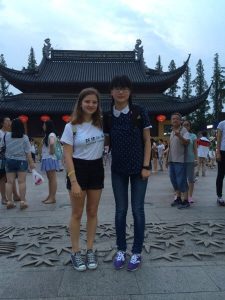 |
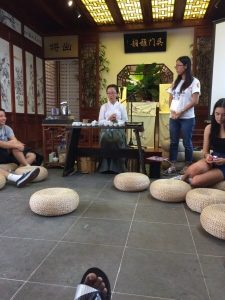 |
Discover Jiangsu 2015
China, which I visited in July as part of the Discover Jiansu program, left indelible memories. During the trip, I had the opportunity to meet new people from many different countries, with whom I am still in touch, and a culture completely different from anything I know. On the first day of the project, we saw modern Shanghai, then went to Suzhou, where we stayed at the hotel and attended classes. In the morning there were Chinese lessons and in the afternoon we had workshops in groups. We got to know elements of calligraphy, sewing, tai-chi, traditional dance, and even fencing. It was the cultural activities that I liked the most, because thanks to them I was able to get to know the customs in China very closely. Suzhou is quite a poor neighborhood. There is terrible chaos in the streets. Although the cars and scooters that almost everyone owns honk all the time, the natives don’t seem to pay attention to them. We spent the last day of our stay with Chinese families. Everyone was very nice and extremely generous. What surprised me was that they were constantly taking pictures of us. As we walked down the street, everyone was watching us, which was a bit funny. After a week we went to Nanjing, where we mainly visited. We saw the Olympic museum, the Nanjing Massacre museum, many gardens and temples. Chinese cuisine, which I would like to mention, is a real adventure for a European – as you can guess, it is based on rice three times a day and is very good, although after some time some project participants began to miss “normal” food. All in all, I am very happy that I could discover Jiangsu and develop my skills in both Chinese and, of course, English.
Kornelia Król, klasa 2a1
Kornelia Król from bilingual class 1A1 will spend her vacation in China!
The trip to China is carried out under the project “Discover Jiangsu – International Youth Leaders to China Cultural Immersion Program” in agreement with the Marshal’s Office of the Małopolska Region. The program includes visits to places such as Shanghai, Suzhou, Nanjing, and lessons in culture, calligraphy, dance, music and sports. All costs of accommodation, meals, transportation in China and the program are covered by Jiangsu Province. Congratulations and envy!



